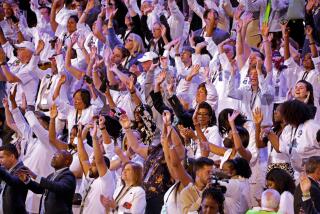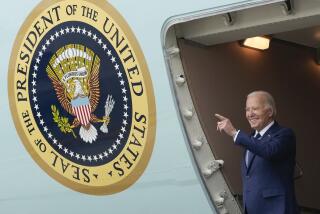Brown Bottles, White Lights and Purple Pancake
- Share via
The transformation of American politics occurred on the afternoon of June 20, 1948. Everything changed with the flip of a switch.
H.L. Mencken, that cantankerous old commentator, described the instant in a dispatch 52 years ago:
“Television will take its first real bite at the statesmen of America tomorrow, and this afternoon there was a sort of experimental gumming or rehearsal in Convention Hall.
“It passed off well enough, all things considered, and no one was actually fried to death.”
Mencken was sitting in the press gallery when the first 10,000-watt TV lamp was tested at a political gathering. It was a pleasant feeling at first. Like being on the beach in warm sunshine. Then nine more of the mighty bulbs came alive. And 10 5,000-watters. He imagined it like the ignition of an atomic bomb.
He clamped down on his stubby cigar and retreated.
“I began to wilt and go blind, so the rest of my observations had to be made from a distance and through a brown beer bottle.”
*
Mencken was not a sympathetic man by nature. But in this case, he allowed himself to fear for the safety of America’s leaders at their presidential nominating convention. He joked that the national committee had an indemnity policy for the widow of any speaker who burst into flames. He reported that people were racing all over the city trying to find out what kind of makeup to wear on TV. Rumor: purple greasepaint.
Mencken need not have worried.
No, this is not a rant against watching television. Way too late for that. According to the Census Bureau, the percentage of American households without a television set is exactly the same as those lacking indoor plumbing, 1.6%. The average family has more TVs than children.
But TV is pouting this time around. Conventions have become the perfection of television--that is, scripted commercials. And the networks are accustomed to being paid for commercials. So we interrupt this convention.
The summer of 2000 will be recorded as the time when America’s political leadership rose up to strut its stuff and TV networks called it staged. By contrast, placing small groups of obscure exhibitionists into isolation to compete for notoriety like prom queens, well, that was reality.
Objection. Aren’t we mixing matters of news and entertainment? My, yes, we are. And guess where we got our cue? TV. Objection overruled.
Campaign 2000 is the 14th election of the Television Age. Each has been a war over imagery, fought on changing terrain with ever more sophisticated tactics. Americans accordingly have become TV-savvy. Yet nothing since the town hall gatherings of Colonial Jamestown has brought so many of the governed so close to the face of democracy.
*
Theodore H. White, who followed Mencken as the dean of American political journalism, understood the power--and the limits--of television. Just 12 years after that first television convention, he wrote: “TV displays events, action, motion, arrival, departure; it cannot show thought, silence, mood or decision.”
Well, OK. America would accommodate itself. Events, action, motion would become the natural way of things. And not just in politics, but in life. Contemplation, meditation, quiet--those things that TV cannot convey--have diminished around us.
Back in 1948, the Democrats nominated Harry S. Truman under 150,000 watts of this new sunlight. The temperature rose to 93 degrees on the convention floor. Women decided against purple greasepaint, but several gave speeches wearing dark brown lipstick. It was said to look good on black-and-white screens. Even though few families yet owned televisions, politicians already reached beyond the delegates.
Truman, the accidental chief executive, the man who unleashed the atomic bomb, thus became the first president to feel the power of another force that changed the world.
Historian David McCullough recounts that the White House installed a 12-inch DuMont “television machine,” as Truman called it, in the Oval Office so the president could watch the opening days of the convention.
Then Truman boarded an afternoon train to deliver his acceptance speech. Television cameras awaited him at Union Station and caught him sitting quietly at the window of his presidential coach.
“No privacy sure enough now,” Truman wrote in his diary.
The network retrenchment at this summer’s conventions will not lower the candlepower on those seeking the presidency. It will only shorten that part of the convention day that matters. Talk faster, Democrats. As Oscar Wilde said, time is a waste of money. And pass down one of those brown bottles, please.
More to Read
Get the L.A. Times Politics newsletter
Deeply reported insights into legislation, politics and policy from Sacramento, Washington and beyond. In your inbox twice per week.
You may occasionally receive promotional content from the Los Angeles Times.










